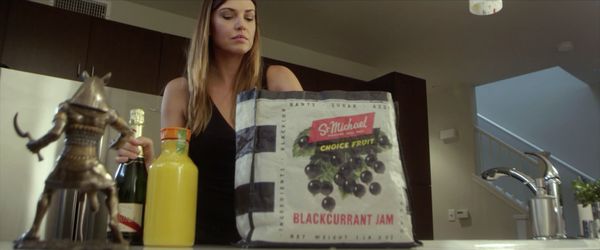Eye For Film >> Movies >> Just One Drink (2015) Film Review
Just One Drink
Reviewed by: Anton Bitel

"The highest reach of injustice is to be deemed just when you are not."
This quote from Plato, appearing in text form at the beginning of writer/director/producer Andrew de Burgh's Just One Drink, also establishes the short film's central theme: the ambiguous guises of righteousness that injustice can adopt. We also know that the film is going somewhere dark and punishing, right from the opening, impressionistic scene: a flashforward to a shadowy basement, its centre occupied by a body concealed under a sheet, with a bound man slumped in a seat to one side, and a half-visible figure hovering on the other side with bloody hands and no less bloody surgical scrubs.

This chamber of horrors is a setting familiar from 'torture porn', and an early appearance by Barbara Nedeljakova (best known for her rôle in Eli Roth's Hostel) might appear to confirm the film's generic affiliations - and yet while more than one act of bodily torment, past and present, will be featured in Just One Drink, these are kept tastefully off-screen, with de Burgh focusing more on the questionable ethics that inform such actions.
Sitting on his bed with ornamental scales (of justice) prominently placed in the foreground, university dropout Steve (de Burgh) receives a Facebook invitation to a New Year's Eve party from Tamara Nolan (Nedeljakova), a woman whom he cannot remember ever having met. Unsure whether to go or not, Steve drops in on his dope dealer Derek (Isaac Anderson). Stoned together, the two young men first discuss the possibility of human evolution, and then move on to the 'insanity' that has led their school to invite supposedly reformed and renate criminals as guests for religion classes. There was even a professor teaching there who had once been a mass murderer under Josef Stalin before emigrating to the States and claiming to have found God. Neither Steve nor Derek can see any contradiction in their belief that a one-time "cocaine dealer" is beyond redemption, even as they both engage casually in the financial exchange of 'Colombian' weed. Derek persuades Stephen that they should go to Tamara's together - after all, "She's hot, isn't she?". Although you know what they say about appearances…
As Tamara is seen unpacking drinks for the party in her Sunset Boulevard apartment, it is hard not to notice, on her kitchen counter, a statuette of the Egyptian god Anubis, weigher of souls and arbiter of the dead - while in her living room there is a figurine of Durga Mata, "a powerful goddess" and "ultimate authority of the universe." The stage is set, the trap is sprung, and as all the thematic strands of the film's first half are brought violently together in a symmetrical set of revenge stories, the viewer is left to pass divine judgment as to who is in the right, and who is in the wrong.
"Fucked-up people" may, as Steve insists, "deserve fucked-up deaths" - but fucked-up people also tend to mete them out, giving rise to a moral paradox that de Burgh is able, in this unforgiving scenario, to push to its extremes. Meanwhile, through its involving narrative structure, Just One Drink exposes the flawed justice and underlying sadism of lex talionis, with injustice - not to mention collateral damage - always hard at its heels, and redemption left in pieces on a slab.
Reviewed on: 17 Mar 2016
















